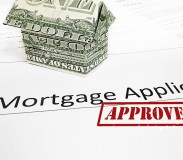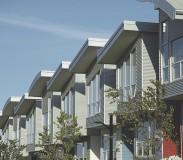
The Future of Fixed Mortgages

A mortgage is a type of loan used to pay for property, such as a single-family home, condominium, or townhome. There are several main types of mortgages, one of which is called a fixed-rate mortgage (FRM). Fixed-rate mortgages are those where the interest rate on the amount borrowed stays the same for the duration of the loan, which last up to 50 years. The person borrowing money benefits from this consistency, as monthly payments are fixed for the duration of the loan and the borrower can plan and budget based on this information.
Popularity
In the United States, the Federal Housing Administration helped develop and introduce fixed-rate mortgages to the public as an alternative to balloon mortgages, where the borrower is required to pay a large sum at the end of the term. Fixed-rate mortgages were the first mortgages of their kind to be fully paid, or amortized, by the time the loan is up. This was a good thing for property owners, resulting in fewer foreclosures. Fixed-rate mortgages are now the most popular form of loan used to purchase property and products in the United States. The most common terms are 15- and 30-year.
Predictions
Fixed-rate mortgages will remain popular in the United States in the coming years, as they offer prospective property owners consistency and security. However, fluctuating rates of fixed-rate mortgages may affect their popularity. Rates change according to the price of United States Treasury bonds. Economic predictions are used to determine the price of these bonds. Inflation is one factor that can decrease the value of bonds over time. When inflation is high or expected to increase in the future, bond prices drop, which means that their yields will rise in time. For borrowers, this means that interest rates rise.
Pros
One of the main benefits of a 15- or 30-year fixed-rate mortgage is that your monthly payments are stable. The payment doesn’t change over the loan, even as interest rates fluctuate. This can help you to confidently plan and budget for the future, without any surprises. Fixed-rate mortgages offer borrowers a sense of security and stability in the knowledge that they pay the same amount every month. When interest rates are low, fixed-rate mortgages are a highly affordable option for property buyers. If you believe that rates will rise in years to come, it’s a good time to get a fixed-rate mortgage.
Cons
 The opposite of security is risk. When you opt for a variable rate mortgage as opposed to a fixed-rate mortgage, you take a risk in the sense that you don’t know how interest rates will change in the future. You may end up paying less interest, and save money in the end. However, taking a risk comes with the potential for both saving money and losing money.
The opposite of security is risk. When you opt for a variable rate mortgage as opposed to a fixed-rate mortgage, you take a risk in the sense that you don’t know how interest rates will change in the future. You may end up paying less interest, and save money in the end. However, taking a risk comes with the potential for both saving money and losing money.
Quick Wrap-Up
Fixed-rate mortgages will continue to remain a popular option for prospective home-buyers in the United States over the coming years. They provide a stable option for those who aren’t willing to gamble on variable rate mortgages and can allow you to successfully plan for your financial future.








